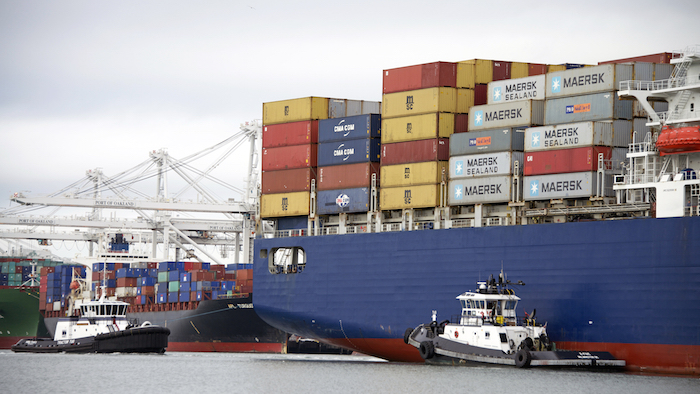PMA &, ILWU quiet as West Coast ports work through backlog - Journal of commerce report

Report from the Journal Of Commerce
Bill Mongelluzzo, Senior Editor | Feb 17, 2015 8:22PM EST
With at least 50 container ships anchored off the West Coast on Tuesday, the eyes of the international trade community were focused on San Francisco to learn if U.S. Secretary of Labor Thomas E. Perez could break the impasse in contract negotiations between the International Longshore and Warehouse Union and the Pacific Maritime Association.
Negotiations Tuesday continued late into the day, but neither the PMA nor the ILWU would discuss what was taking place behind closed doors.
Meanwhile, terminal operators in Seattle, Tacoma, Portland, Oakland, Los Angeles and Long Beach resumed vessel, yard and gate operations Tuesday after four days of on-again, off-again calls for labor by employers over the President’s Day weekend. The PMA since Thursday had maintained a policy of cancelling much of the work that called for overtime pay to longshoremen. The PMA said employers could no longer afford to pay longshoremen overtime wages for working at half speed.
Terminal operators were therefore working to clear out the backlog of containers that had accumulated at the ports over the weekend, and to finish working vessels that were at berth so newly-arrived vessels could be brought to berth. The Marine Exchange of Southern California reported that 22 containerships were at anchor Tuesday morning, one less than on Monday. Oakland said 19 vessels were at anchor or waiting outside of Golden Gate Bridge, and about nine vessels were at anchor outside of Tacoma.
This week could be do or die time for the negotiations, which began on May 12, 2014. The PMA has said on several occasions that employers can not afford to pay longshoremen in Seattle, Tacoma and Oakland who have reduced crane productivity by more than 30 percent since early November. In Los Angeles-Long Beach, the ILWU has reduced the daily dispatch of skilled equipment operators from 110 to 35. The ILWU denies that it is hard-timing employers to gain leverage in the negotiations, although the PMA has recorded the shortfalls each day for the past three and one-half months.
In order to get its message to the rank and file that employers consider their last contract offer to be a generous one, the PMA
in early February held a press conference outlining its offer to the union. PMA President James McKenna said employers agree to continue paying 100 percent of the health-care premiums for longshoremen, including an estimated $150 million a year in the Cadillac tax associated with the Affordable Health Care upon program. The maximum annual pension would increase to $88,800 a year.
The employers’ proposal includes a 14 percent increase in wages over the five-year life of the contract. PMA said the average annual earnings for full-time longshoremen last year were $147,000. The employers’ proposal also grants jurisdiction to longshoremen to inspect and repair all chassis before they leave a terminal, even though shipping lines no longer own most of the chassis.
Noting that the PMA has agreed to almost all publicly-stated demands of the ILWU, industry participants not only say this is a good contract proposal for the ILWU, but they also ask, “What’s in it for the employers?”
According to the PMA, the one issue employers will stand firmly in opposition to is the ILWU’s demand that area arbitrators, who are approved jointly by both parties, can be fired at the end of a contract period unilaterally by either the ILWU or the PMA. The PMA emphasizes that arbitrators could not rule impartially in handling day-to-day grievances on the waterfront if they feared the ILWU would fire them for ruling against the union.
Meanwhile, a number of shipper organizations have flooded the media with requests for an end to the contract stalemate that has made West Coast port congestion unbearable. For example, the Agriculture Transportation Coalition on Tuesday noted that
U.S. agricultural exports are down $1.75 billion a month. The National Pork Producers Council reported losses of $170 million a month while exports of hides, skins, forage and potatoes are also down by tens of millions of dollars a month.
Contact Bill Mongelluzzo at bmongelluzzo@joc.com and follow him on Twitter: @billmongelluzzo
Industry News
Read the latest news from TCF International.
MELBOURNE & SYDNEY PORTS EXPERIENCE HIGH WINDS - DELAYS EXPECTED
Join our mailing list
Copyright © 2023 TCF International All rights reserved



